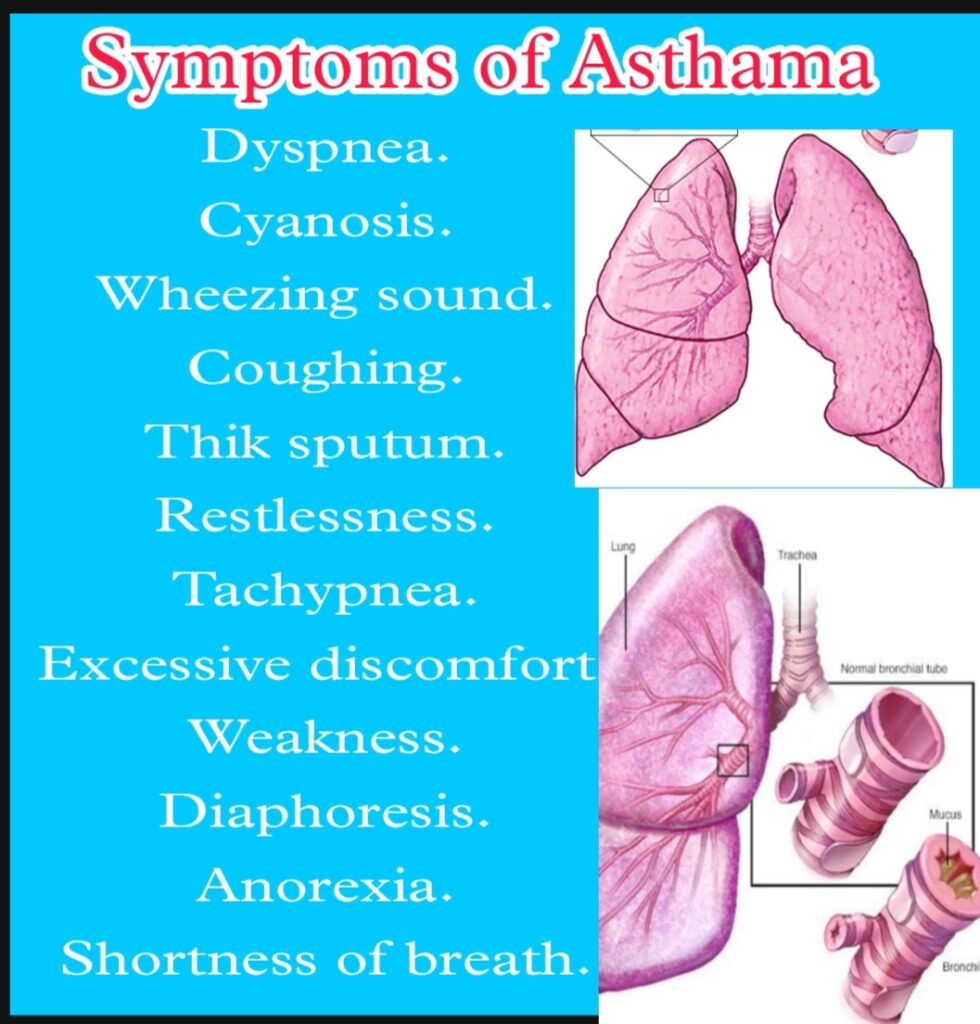Asthma of definition:-
A condition in which a Person’s airways become inflamed, narrow and swell and produce extra mucus which makes it difficult to breath.
Asthma is a chronic inflammatory disease of airway caused by allergic response of bronchi resulting in reversible narrowing of airway due to bronchocon-striction ( spasm), congestion and thickening of walls of bronchi and accumulation of mucus. ( Recurrent attack of dyspneoa and wheezing).
Causes:-
Allergies- such as to pollen dust mites, mold animal fur or feathers. Spores Smoke, fumes and pollution. Pet danger or particles of cockroach waste Medicine– particularly anti-inflammatory painkiller like Ibuprofen and aspirin including stress or laughter.
Symptoms:-
- Dyspnea.
- Cyanosis.
- Wheezing sound.
- Coughing.
- Thik sputum.
- Restlessness.
- Tachypnea.
- Excessive discomfort.
- Weakness.
- Diaphoresis.
- Anorexia.
- Shortness of breath.
- Prolonged expiration.
- Frequent respiration.
- Chest pain.
- Throat irritation.
- Anxiety.

Complications:-
- Constant fatigue.
- Frequent leave from work or school due to constant asthma flare-up.
- Pneumonia.
- Increase mucus production.
- Thickening and narrowing bronchial tubes which can become permanent leading to respiratory failure.
- Respiratory failure.
- Severe chest pain.
- Hypoxemia.
- Pneumothorax.
- Death.
Diagnosis:-
- Chest X-ray.
- Bronchoscopy.
- Complete blood count.
- ABG ( Arterial Blood Gases).
- SpO2 level checking.
- PFT ( Pulmonary Function Test).
- Spirometry.
Physical Examination:-
- Examine your nose, throat and upper airways.
- Use a stethoscope to listen to your breathing. Wheezing– high pitched whistling sounds when your breath out– is one of the main sign of asthma.
- Examine your skin for signs your allergic conditions such as eczema and hives.
Medical management:-
Treatment consists of self care and bronchodilators.
Asthma can usually be managed with rescue inhalers to treat symptoms ( Salbutamol) and controller inhalers that prevent symptoms ( steroid) severe cases May require longer-acting inhalers that keep airways open (formoterol, salmotrol, tiotropium), as well as inhalant steroid.
Four strategies for managing asthma.
- Identify and minimize contact with asthma triggers.
- Understand and take medications as prescribe.
- Monitor asthma to recognize signs when it getting worse.
- Know what to do when asthma gets worse.
I hope that you liked this article……….!!
Thanking you……….!!
By GS India Nursing………!!